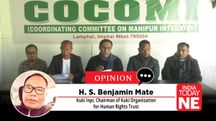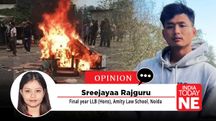Reservation imbroglio in Bangladesh: Lessons for India
Reservation in jobs was perceived with angst in Bangladesh since its introduction in 1972 and as a nascent state Bangladesh experienced resistance to it, with the University of Dhaka as the epicenter of protest.
 Reservation imbroglio in Bangladesh: Lessons for India
Reservation imbroglio in Bangladesh: Lessons for IndiaBangladesh right now is boiling and witnessing civil unrest in an unprecedented scale to eliminate the quota system from civil services. Bangladesh, like India, has a job reservation system. However, unlike in India, Bangladesh does not have caste-based reservations. Instead, in Bangladesh ‘quota’ is more akin to affirmative action, benefiting primarily those who participated in and are the descendants of the freedom fighters of the 1971 liberation struggle of Bangladesh, famously known as Mukti Yuddha. Reservation in jobs was perceived with angst in Bangladesh since its introduction in 1972 and as a nascent state Bangladesh experienced resistance to it, with the University of Dhaka as the epicenter of protest.
However, the then-Awami League Government, led by Sheikh Mujibur Rahman, believed that Bangladesh's freedom had been hard earned, and that ordinary civilians who fought and put everything on the line against the mighty Pakistani army deserved some state protection so that their selfless sacrifice could be compensated and they could return to the mainstream of life. So, 30 percent of quota in public services was guaranteed for them. With this similar spirit, 10 percent of reservation was granted to women as women in large number suffered destitution and endless misery and sexual violence perpetrated by the Pakistani army during the liberation struggle of the country. Thus, the quota in civil services and certain other jobs was adopted in Bangladesh during the time of its inception as an independent nation state primarily to reinstate the families of martyrs and women who suffered worst victimhood during the liberation struggle. In this endeavour, 30 percent of jobs were reserved for the Muktiyudhhas and their descendants, 10 percent for women who suffered sexual violence and destitution during the war, 10 percent for people of underrepresented districts, 5 percent for the indigenous population and 1 percent for specially abled people. But the quota system in Bangladesh faced criticisms and protests from time to time and after a large scale protest in 2018 the current Sheikh Hasina Government decided to abolish the quotas in jobs altogether which became operational since 2020 after an executive order was issued by the government to this effect.
On June 5, 2024, the Bangladesh High Court rejected Ms. Hasina's executive order that dissolved all quotas. Instead, the High court ordered for the restoration of all quotas in Bangladesh's civil service. This court intervention was prompted by an appeal filed by the descendant of a freedom fighter and six other individuals. Subsequently, the Supreme Court of Bangladesh issued a stay on the High Court’s order, putting the matter in abeyance until the hearing on the current government’s appeal on the High Court’s decision was not over. However, the unrest persisted since there was apprehension that the Sheikh Hasina Government would attempt to restore the quota system again by an executive order just as it had abolished it. However, on July 21, the Supreme Court of Bangladesh issued an order reducing the reserve category slab from 56 percent to 7 percent. To comply with the Supreme Court judgment, the Sheikh Hasina government quickly published a Gazette announcement. This led to a sigh of relief to the agitators and the agitation was rolled back although did not subside completely. Some unrest continues which is precipitated by the fear of a return of the erstwhile job reservation policy in Bangladesh.
In contrast to what is happening in Bangladesh, the scenario in India is just the reverse. In their fifty years of independence, the people of Bangladesh realized that the reservation in jobs cannot be a permanent policy for a country as it has hazardous effect both on the economy and social harmony. But the perception in India in this matter is quite reverse. No one no more is interested to know how far the reservation policy succeeded in bridging the social divides and whether the good old policy is compatible enough to fulfill the aspirations of the youths of the 21st century India.
In India, reservation is a highly sensitive political issue. When a large section of the population feels that it is high time to revisit India’s reservation policy, the political elites in India is reluctant to make any tempering in this highly sensitive electoral issue. In fact, reservation in jobs, educational institutions has become a sacrosanct issue in our country which can neither be questioned nor can be discussed objectively. Any incidence of oppression on an individual belonging to lower castes takes the centre stage of debate in caste lines across media and is condemned vehemently by the political class, intellectuals and cross section of people but the reverse is ignored and obliterated by the broad narrative of decades old caste oppression. Reservation’s power to mobilize electoral support would never allow the ruling dispensation of our country to make an impartial assessment of the policy’s outcome and reform accordingly so that the principles of social justice and equality are upheld in the true spirit of the constitution. Indian constitution abolished caste discrimination, caste hierarchy and untouchability at the dawn of India’s independence. Barring few aberrations caste discrimination and caste prejudice are hardly practiced in modern India.
Nonetheless, the narrative of caste discrimination has been perpetuated and sometimes exaggerated as an expedient weapon to polarize voters and garner electoral dividends. This has also been made a narrative to gain the sympathy of the intelligentsia. As a result, in last 76 years there has been made no attempt to assess the impact of reservation on the socio-economic status of castes that are not within the ambit of reservation. Many castes which were considered to be backward moved forward in the ladder of development and no longer need the benefit of the quota. The government is unwilling to make any decision in this regard. After more than seven decades of the existence of the reservation policy, it is imperative to develop a far more precise definition of ‘Backwardness’ so that the castes still at the margins may be reached out effectively. It is also high time to think about the implementation of the ‘creamy layer’ slab in case of SCs and STs. This could be an effective measure to remove individuals who no longer require the benefit of reservation in the interests of those who continue to lag behind. It is also imperative to ensure far more affirmative action for people of marginalized sections so that they get the quality education, scholarship, etc and can stand at par and can compete with students from upper caste category. India’s constitution made the provision of reservation with the twin goals of equality and fraternity. Thus, a periodic revisit to the policy is important to uphold brotherhood and to obliterate the menace of caste system in India both from the society and more from the electoral landscape of the country. What happened in Bangladesh may not be possible in India but at least some objective debate about the impact of reservation on our society and economy may be initiated at the greater interest of the future of the country.
( Joyati Bhattacharya is a professor at Assam University )
Copyright©2026 Living Media India Limited. For reprint rights: Syndications Today









